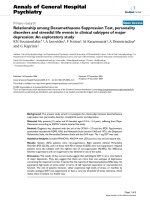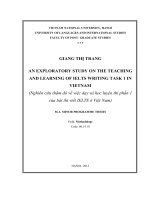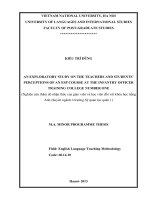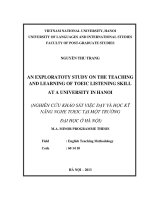Reflective practices and teacher educators an exploratory study
Bạn đang xem bản rút gọn của tài liệu. Xem và tải ngay bản đầy đủ của tài liệu tại đây (127.81 KB, 8 trang )
International J. Soc. Sci. & Education
2012 Vol. 3 Issue 1, ISSN: 2223-4934 E and 2227-393X Print
Reflective Practices and Teacher Educators: An Exploratory Study
By
1
Hajira Bibi and 2 Shamsa Aziz
1
2
Visiting lecturer, Federal College of Education H–9 Islamabad
Assistant professor, International Islamic University, Islamabad
1
2
Abstract
Reflective practice is a technique through which teachers can improve their effectiveness in the
classroom. It is a proof of self observation as it can be helpful for the teachers for a deeper
understanding of their teaching style and for ensuring the effectiveness as a teacher. The basic objective
of the study was to study the current situation regarding reflective practices at university level. The
population of the study consisted of all the teachers of education department/facu lty of Public and Private
sector universities of Rawalpindi and Islamabad. An opinionnaire was administered to collect the data.
The responses of 42 faculty members were received in total. The results of the study showed that teachers
normally write the diary, encouraged towards the instructional management, observe the practice of
keeping and managing students’ records, get feedback from other colleagues, evaluate themselves and
had good coordination with their colleagues and students. On the basis of the results of the study it was
recommended that for the professional development of teachers, reflective practice may be upgraded,& a
professional development programs may be conducted. It is also recommended that reflective practice
should be introduced as a course in teacher training programs and practical approach of reflective
practice be embedded in in-service teacher training programs.
Keywords:
Reflective practice, Teacher education, University teachers
1. Introduction
The concept of “Reflective practice” is one of latest strategies employed for the profession al development
of the teachers. It is different from the traditional professional development where usually teacher has a
central position, which focuses on single concept without any discussion with students or colleagues. On
the other hand, reflective oriented professional development of teachers includes getting feedback from
colleagues, sharing experiences and critical reflection in which they question and examine their own ideas
and assumptions about teaching. It allows teachers thinking back over and then critically commenting on
what happened. On the basis of that critical thinking they use these new learning to improve future
activities.
Definition of Reflective Practice
Reflective practice concept was introduces by Donald Schon in 1987 as a critical process in refining
one’s abilities in specific disciplines , he defined that reflective practice involves full concentration of
one’s own experiences in applying knowledge and introducing new techniques for professional
development(Schon,1996).
Epstein and Hundert, (2002) defined reflection as daily practice for the benefit of individuals and
communities being served while Duffy (2007) believes that reflective practice is an active deliberate
process of critically examining practice, where an individual is challenged and enabled to undertake the
process of self-enquiry to empower the practitioner to realize desirable and efective practice within a
Hajira Bibi and Shamsa Aziz
reflexive spiral of personal transformation. Thus reflection in teaching is not only an ability to look back
to all the situations and make sense of what happened and what have been learned from daily experiences
but according to Epstein and Hundert (2002) it is an ability to look forward to anticipate what is coming
up and what teachers need to do for the professional development .
Forms of Reflective Practice
Westberg and Jason, (2001) defined three forms of reflective practices as Before an experience reflection
is called “anticipatory reflection”, During an experience “reflection in action” and works following
experience is known “reflection on action
Reflection and Teachers
Effective teachers are likely to be those who reflect on their teaching, update their skills and think of
teaching from the perspective of its teaching on learners rather than the perspective of covering content.
Reflective practice is a process of nourishing the minds of the students and this process can be effective if
the person who is going to take the responsibility of making the minds of individuals is professionally
trained. There are several teaching practices for grooming the teachers as micro teaching, te am teaching
etc and at present time the most famous term is called “reflective practice”. It is a powerful approa ch to
professional development as it always focuses on behavioral change and self improvement. It is also
based on the belief that any organizational change can be possible if the behaviors of the workers are
changed. Farrell (2007) was of the opinion that people could not develop themselves professionally
unless they are willing to bring change into their field same is true for teachers and teacher educators as in
any educational organization teachers are responsible to create change and examine their own behaviors
carefully (Rashid, M 2000)
Development of teachers in teaching profession is very important because effective learning of students is
based upon the effective teaching. As Larrivee (2000) argues, Reflective Practice moves teachers from
their knowledge base skills to a stage in their careers where they are able to modify their skills to suit
specific contexts and situations, and eventually to invent new strategies.
Reflective practices provide feedback to the teachers for future planning as they make judgments on the
past events and plan for the further .In this process of reflection teacher always try to learn from the past
experiences and make new strategies to overcome the professional weaknesses. When teachers re flect
they used to notice all within and outside the class activities. It did not only mean to evaluate student’s
performance but also examining one’s own performance. (Boghani, A.A.2008)
Strategies for Reflection
Reflective writing involve following steps (1) Look back to the event, (2) Think why it happened (3) Find
out causes (4) Find out suitable strategies
Airasian & Gullickson (2006) enlists eight general strategies which can be used to supplement and
enhance reflection i.e. .use of Self-reflection tools, Media recording and analysis, Students’ feedback,
Teacher portfolios, Student performance data, External peer observation, Collegial dialogue/experience
sharing/joint problem solving and writing teacher diary
Activities involved in Reflective Practice Process
The activities involved in reflective practices process are gathering data by the teachers about their
practice, writing teacher diary and relationships with teaching colleagues
Research on Reflection and Teachers
Wildman and Niles (1987) presented a study on teacher reflection in the Virginia public schools, assert
that it is necessary to systematically taught reflective teaching skills and then nurtured over a period of
9
Reflective Practices and Teacher Educators: An Exploratory Study
time. During their study, they worked with 20 experienced teachers, helping them to become more
reflective. These teachers then became mentors to promote reflective behavior on the part of
inexperienced colleagues. At the end of 2 years, they found that teachers used to apply reflective teaching
practices in their classrooms.
Ojanen (1993) conducted a res earch to identify role of the students while developing abilities that are
very important in reflective teaching, the researcher highlighted the duties of the teacher as a guide and
study was aimed to analyze teacher’s performance as a guide. The study sho wed that teacher educators
performed their teaching duties effectively by coaching student teachers in teaching practice by using
students' personal records, dialogue journals, sharing their experiences with colleagues and basic purpose
of guidance was to prepare them for future development. The research highlighted the concept, levels,
techniques for, and benefits of reflective practice.
Kettle and Sellars (1996) presented their study that revolved around those students who were using
reflective practices into their studies. For this purpose, they took interviews from those students as well as
examined them to analyze their performance and to explore the effects of reflective practices into their
development. Reflective practices were not only used by in service teachers but also by the student
teachers.
2. Methodology
Better teaching standards always required teachers to reflect on themselves and share their experiences
for improvement. The present study therefore explored reflective practices adopted by the university
teachers. All the public and private universities having faculty or Department of Education were included
in the study. The sample comprised of 42 faculty members. A five point Likert scale, having options
strongly agreed, agreed, undecided, disagree and strongly disagreed was developed to measure the extent
to which the university teachers were using reflective practices in their teaching. The number of the items
included in the opinionnaire was 60 at the first stage. All the teachers of Education department of
International Islamic University Islamabad were selected for pilot test and they were not included in the
actual sample of the study. Ten items were dropped as a result of judgmental validity of experts and
reliability score. Thus the final form of the opinionnaire had 50 statements. After pilot test the reliability
of the instrument was calculated by (Cronbach alpha) for 60 statements and it was 0.733, however after
deleting or refreshing some items/statements reliability was increased up to 0.783. After collecting the
entire data, reliability was measured which was .876.
3.
Findings
After analyzing the data the following are the findings of the study:
Table 1. Item statistic for teacher diary
Statement
N
Mean weight
Writing teacher diary is a time consuming activity.
42
3.29
Write your teaching experiences on a diary
42
3.14
Over all mean
3.21
The overall mean value of 3.21 as in table 1 shows that teachers normally write the diary.
10
Hajira Bibi and Shamsa Aziz
Table 2: Item statistic for Instructional management
Statement
Modify your teaching according to their needs
Lead the class to a purposeful end
Teacher’s interest toward lesson is important than students
Emphasis on completing of syllabus
Easily change your lesson plan
Create effective learning environment and holds that
Readiness of the students is necessary for shifting towards next phase
of teaching
Over all mean
N
42
42
42
42
42
42
42
Mean weight
4.43
4.24
4.17
3.26
3.26
4.40
4.40
4.02
The overall mean value 4.02, shows that teacher are very much encouraged towards the instructional
management aspect of reflective practices
Table 3: Item statistic for record keeping:
Statement
Keep student’s achievements record
There is a proper system of evaluating the student’s record by the university
The facility of recording lesson is available during the class
N
42
42
42
Mean weight
4.19
3.81
2.26
3.42
Over all mean
The mean weight of 3.42 clearly represents that most of the teachers observe the practice of record
keeping and managing students’ records; for students as well as for themselves
Table 4: Item statistic for readiness to learn:
Statement
You have readiness to learn from students
Allow anyone/colleagues to suggest ways for your zzteaching.
Its not necessary to learn from students
Get feedback from student’s opinions
Over all mean
N
42
42
42
42
Mean weight
4.24
4.19
3.48
3.95
3.96
Results in table 4 shows the willingness of teachers in doing group work as well as the norms to get
feedback from other colleagues. The overall mean value 3.96 shows that teachers appear to be fully
motivated towards the collaborative work and that they want to learn from one another.
Table 5: Item statistic for self evaluation:
Statement
Assess your teaching by yourselves.
Easily evaluate student’s performance in individual tasks
Students are completely involved in your lessen.
Clarity of concepts are important than completing the syllabus
Over all mean
N
42
42
42
42
Mean weight
3.40
3.76
3.00
4.36
3.63
Results in the table .5 are all about the self evaluation of the teachers by themselves. The overall mean
value of table 3.63 shows that university teachers evaluate themselves after receiving the output from
students’ performance. According to the mean value it is clear that individual evaluation of the students is
commonly adopt by the teachers.
11
Reflective Practices and Teacher Educators: An Exploratory Study
Table 6: Item statistic for providing guidance:
Statement
N
Always available for the students
Ready to help the students outside the class
Believe in the group work of the students
Not consider the personal problems of the students
Students share problems regarding learning with you
Revise and correct students mistakes at the end of the class
42
42
42
42
42
42
Over all mean
Mean
weight
4.36
4.40
3.96
3.31
3.90
3.95
3.98
Table 6 pertains to whether teachers were there to provide guidance to the students in the class room as
well as beyond classroom setting. The overall mean value of 3.98 shows that teachers were most of the
time consider the problems of the students as well as students had an easy access to teachers to share
problems in the learning process.
Table 7: Item statistic for peer observation:
Statement
N
know all the co-curricular activities of the students
Aware about the class environment during teaching
Teacher’s first priority is to observe students during class time
Students feel comfortable in doing group assignments
Group work of the students is often problematic for you
Over all mean
42
42
42
42
42
Mean
weight
3.50
4.45
4.33
3.12
2.60
3.6
Results in the table 7 are about teacher’s observation of the students. The mean value of 3.6 indicate that
university teacher commonly observe students to a reasonable extent.
Table 8: Item statistic for critical incident:
Statement
N
Decide the aims of the task during class
Supportive of any problem encountered
Discuss performance of the students with your colleagues
Get help from colleagues in critical incident
Over all mean
42
42
42
42
Mean
weight
4.21
3.81
2.71
3.76
3.62
Results presented above are about the teachers’ attention towards the problem encountered by the
students and collaboration with other colleagues while discussing student’s problems. The overall mean
value of table 3.62 shows that most of the university teachers do decide the aims of the t ask and also get
help from their colleagues in critical incidents.
Table 9: Item statistic for use of Audio Visual Aids:
Statement
Use of A.v.aid facilitate the teaching learning process
Demonstrate new ideas and ways of teachings
Proper A.v.aid are available to assist your lesson
Over all mean
12
N
42
42
42
Mean weight
4.38
4.17
3.67
4.07
Hajira Bibi and Shamsa Aziz
The overall mean value of 4.07 shows that all university teachers facilitated their teaching with available
audio visual aids. Use of audio visual aids is considered imperative for supplementing reflective
practices.
Table 10; Item statistic for sharing of experiences:
Statement
Allow your colleagues to observe you during the Session
You have good coordination with students
Share your experiences with your colleagues
Receive feedback from the colleague’s opinions
Over all mean
N
42
42
42
42
Mean weight
3.71
4.12
4.14
3.81
3.94
The overall mean value of table 3.94 shows that almost all of the university teachers had good
coordination with their colleagues and students.
Table 11: Item statistic for teacher’s self observation:
Statement No
Statement
2
3
6
40
14
21
Overall mean
N
42
42
42
42
42
42
Your academic activities move around teaching
Establish aims and parameters of your task
Know all the co-curricular activities of the students
There is no liking and disliking for students
Visit library for enhancing your knowledge
You are committed to your work
Mean
weight
.952
1.042
1.452
.803
1.064
.697
4.06
The overall mean value of 4.06 makes it clear that teacher’s self evaluation is adopted by all the
university teachers.
Table 12: Item statistic for professional satisfaction:
Statement NO
Statement
Present teaching methodology at university level is
1
enough to fulfill students’ need
8
Satisfied with the present status of teaching
Overall mean
N
Mean weight
42
42
2.81
4.17
3.49
The overall mean value of 3.49.represents that most of the teachers at university level are satisfied
regarding their profession
4. Findings and Conclusions
1.
The result of the study shows the overall mean value of 3.21 in perspective of using teacher
diary by university teachers. It can be concluded that whether they are using teacher dairy at
satisfactory level but sometimes they considered it a time consuming and bo re activity.
2.
Instructional management is very important to keep students on right path and here results shows
that teachers are giving importance to instructional management aspect of reflective practices
during teaching. This can be concluded that teachers are highly motivated towards managing
instructions during class at university level.
13
Reflective Practices and Teacher Educators: An Exploratory Study
3.
Results shows that teachers are having skills of record keeping of their learners for future
development. This reflective activity can be done to keep them informed rega rding their
achievements.
4.
Readiness to learn from other’s experiences is very important for future development of
teachers. The result of the study regarding the attribute o f readiness to learn shows that teachers
are fully motivated towards the cooperative work with colleagues and that they want to learn
from one another.
5.
The results of the study regarding self evaluation consist shows that university teachers do self
evaluation after receiving the output from students’ performance.
6.
The result of the study shows mean value of 3.98 regarding teacher’s guidance for the students
in the classroom or outside the classroom. This can be concluded t hat teachers are providing
guidance to the students in their problems.
7.
Results obtained show that students' individual work/ assessment are considered more suitable
by teachers as compare to their group work /performance.
8.
Results of the study on critical incidents sharing with colleague with mean value of 3.62 shows
that most of the university teachers like to get help from their colleagues in different areas like
sharing student’s achievement, classroom experiences, getting feedback in solving critical
incidents etc.
9.
The results of the study indicated that use of audio visual aids is considered beneficial activity in
reflective practices not for the teachers but also for learners.
10. Sharing of experiences is also very important in reflective practices and here the result of the
study shows mean value 3.94.
11. All the university teachers adopt self evaluation; the overall mean value of 4.06 makes it clear.
12. The overall mean value of 3.49.represents that most of the teachers at university level are
satisfied with their profession
5. Discussion
Study showed that reflective practices are very important for teachers to develop professionally. These
findings are also supported in the research conducted by Kettle and Sellars (1996).Many respondents
were of the opinion that reflective practices was a best technique for the professional development of the
teachers and teaching profession..
Another major finding of the study was that teacher educators performed their duties effectively by giving
guidance to student teachers in reflective practices with the help of students' personal records, sharing
their experiences and performance with their colleagues to help them. These findings were also supported
by the work done by Ojanen in (1993) in which he stated that educators performed their teaching duties
effectively by coaching student teachers in reflective practice with the help of students' personal records,
dialogue journals, sharing their experiences with colleagues about their performance to help students
reflect upon and improve their practices.
6. Recommendations
Keeping in view the findings, following recommendations are g iven:
1.
Reflective practice has a powerful influence on teacher’s performance at university level so it is
also necessary that teachers should have awareness about the reflective practices and its effect on
14
Hajira Bibi and Shamsa Aziz
the academic performance of their students. The stu dy recommended that the teacher may be
given an orientation on the use of reflective practices.
2.
It is also recommended that reflective practice should be introduce as a cours e in teacher
education programs so that teachers get awareness about reflective practices for their
professional development.
3.
There is a need of introducing the practical approach of reflective practice embedded in in service teacher training programs. Professional development programs may be conducted
periodically by focusing on different aspect of reflective practices.
4.
There is a strong need for creating cooperation between universities and Higher Education
Commission regarding quality check based on various parameters of reflective practices.
References
Airasian and Gullickson (2006) Teacher self-evaluation. In: J. Stronge, (Ed), Evaluating teaching: A
guide to current thinking and best practice, Corwin Press, Thousand Oaks, CA (2006), pp. 186–211.
Boghani, A.A.(2008).Reflective Practices for classroom teachers London
Duffy, A. (2007). A Concept analysis of Reflective Practices determining its values. British Journal of
Nourishing.16,(22):1400-1407
Epstein RM, Hundert EM. (2002) Defining and Assessing Professional Competence. JAMA; 287: 226235
Farrell, T. S. C. (2007). Reflective language teaching: From research to practice. London: Continuum
Press.
Kettle B. and Sellars, N. (1996). The development of student teachers practical theory of teaching.
Teaching and Teacher Education,12(1),1-24.EJ 526790
Larrivee, Barbara (2000). "Transforming Teaching Practice: Becoming the critically reflective teacher".
Reflective Practice 1: 293. doi:10.1080/713693162.
Ojanen, S. (1993). A process in which personal pedagogical knowledge is created through the teacher
education experience. Paper presented at the International Conference in Teacher Education, TelAviv, Israel. ED 398 200
Rashid, M. (2000).”Teaching Strategies” National book foundation: Islamabad
Schon, D.A. (1996).Educating the Reflective Practitioner: Toward a new design of teaching and lea rning
in profession. San Francisco P:Jossey-Bass,Inc.
Westberg, J. and Jason. (2001).Fostering Reflection and providing feedback. Helping others learn from
experience. Springer Series on Medical Education,
Wildman, T. and Niles, J. (1987).Reflective Teachers: Journal of Teacher Education. July-August, .2531.
15








